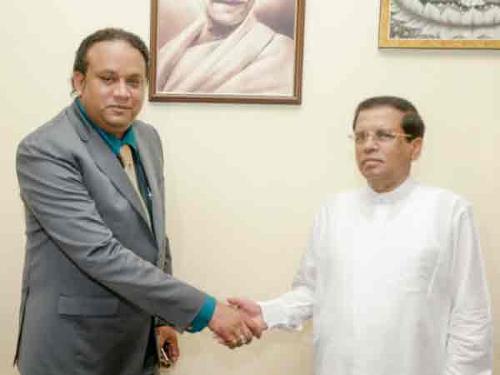July, 4, 2015

THE Dubai-based Gammon Group will develop a Free Zone and implement other projects worth $1.2 billion in Sri Lanka, according to its Chairman Sheikh Rafik Mohammed.
“The government of Sri Lanka has agreed to provide all the facilities, including 700-800 acres of land, for setting up of the projects in the pattern of Dubai Free Zone projects.”
“There have been preliminary talks in this regard (the project) during our recent meeting with President Maithripala Sirisena and other senior Sri Lankan officials in Colombo, and accordingly the licensing procedures for the Free Zone Company will commence in August,” he said while hoping that the project works would begin by early 2016.
Speaking to Saudi Gazette, Mohammed said that his group would soon sign a memorandum of understanding (MoU) with regard to setting up of the Free Zone project.
He described the meeting with Sirisena as quite productive and extremely encouraging. “The Lankan government was very much interested in associating with the Gammon Group in developing the Free Zone in Pollanaruwa and Valacheni regions in the island nation’s eastern province with a sizable population of Tamils of Indian origin.
The group has also plans to develop a knowledge city in Valacheni, as well as hospitals and roads in the country,” he said.
During the talks, senior government officials, including Minister of Home Affairs Amir Ali Shahabdeen also attended.
“Actually, our talks were held in the morning, but after this meeting, the president suggested a second round of talks in the evening to discuss various aspects of implementing the Free Zone project,” he said.
Mohammed said his group was immensely pleased and proud to shoulder the responsibility of setting up the Free Zone in a way fulfilling the great trust reposed on it by the Sri Lankan leaders.
“Gammon Group is keen on tapping the immense potential for development in the island nation, especially in the Eastern Province, which is an ethnically mixed and economically deprived region heavily hit by the two-decade-long civil war.
Since the restoration of internal peace and normalcy in the country, many Indian firms have started showing interest in investing in Sri Lanka and the Free Zone would open up new doors for them,” Mohammed said.
According to the Gammon chief, the biggest motivation for Sri Lanka to enter the Free Zone experiment came from the example set by Dubai, which had astounded the world with its successful Free Zone projects.
“It was the realization that such projects, implemented with far-sightedness, were indispensable for the development of any country in the present era, is what attracted Sri Lanka toward Free Zone concept,” he said.
Mohammed said the proposed Free Zone would be devoted to industries after taking into account Colombo’s priorities.
“The government wanted to establish more industrial plants in the fields of manufacturing tire, paint, and electrical appliances, and of course there will be a priority for such industries in the Free Zone,” he said.
Mohammed had been invited to discuss the possibilities of managing the infrastructural development of Sri Lanka by Sirisena in March this year.
During the visit, he attended a dinner hosted by Sirisena in honor of the visiting Indian Prime Minister Narendra Modi. During the visit, Mohammed and Gammon Group CEO Dr. Faiz Al-Abideen also met Modi in Colombo.
Gammon Group, with a capital of two billion dirhams, is a global construction company with strong presence in emerging markets in Asia, Middle East and North Africa.
The group has been assigned to develop the SR75 billion Jazan Industrial City by bringing in foreign investors to build its entire infrastructure facilities.
The UAE-based Indian business tycoon B.R. Shetty has already entered into agreement for investing in the Jazan project. Mohammed, an Indian-born enterprising entrepreneur, became chairman of the group 13 years ago.
Saudi Gazette
Video Story